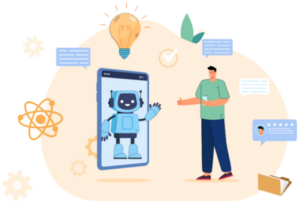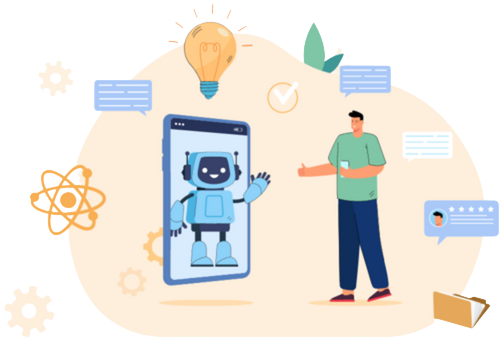Artificial intelligence (AI) and machine learning (ML) have taken the tech world by storm, and the trend is only set to continue. The integration of AI and ML into mobile apps has opened up a world of new possibilities, but it also comes with its fair share of challenges.
Artificial intelligence (AI) and machine learning (ML) have taken the tech world by storm, and the trend is only set to continue. The integration of AI and ML into mobile apps has opened up a world of new possibilities. But it also comes with its fair share of challenges.
In this blog post, we will discuss the opportunities and challenges of integrating AI and ML into mobile apps. And how organizations can effectively navigate them.
Opportunities for Integrating AI and ML into Mobile Apps
-
Personalization and Customization
One of the biggest advantages of integrating AI and ML into mobile apps is the ability to offer a highly personalized and customized user experience. AI algorithms can analyze user behavior and preferences, and then tailor the app’s functionality and content to meet their specific needs. This level of personalization is not only convenient for users but also helps increase engagement and loyalty.
-
Improved User Experience
AI and ML can also be used to make the overall user experience more seamless and intuitive. For example, chatbots powered by AI and ML can provide instant customer support, freeing up human customer service representatives for more complex issues. In addition, AI algorithms can be used to predict user behavior and make suggestions or predictions, making the app more intuitive and easier to use.
-
Increased Efficiency and Productivity
AI and ML can also help increase efficiency and productivity by automating certain processes and tasks within the app. For example, a machine learning algorithm can be used to automate the tagging and categorization of images, freeing up manual labor and allowing teams to focus on more important tasks.

Challenges of Integrating AI and ML into Mobile Apps
-
Data Privacy and Security
One of the biggest challenges of integrating AI and ML into mobile apps is ensuring that user data is secure and protected. AI algorithms collect and analyze vast amounts of data, and if this data falls into the wrong hands, it can be used for malicious purposes. Organizations must have robust data privacy and security protocols in place to ensure that user data is protected.
-
Technical Challenges
Integrating AI and ML into mobile apps also presents technical challenges. The algorithms used in AI and ML are complex, and getting them to work effectively within a mobile app environment can be challenging. Organizations must have a strong understanding of AI and ML technology. As well as the expertise to implement it effectively, to overcome these challenges.
-
Cost
Another challenge of integrating AI and ML into mobile apps is the cost. The development and implementation of AI and ML algorithms can be expensive. And organizations must weigh the costs against the benefits to determine if it is a worthwhile investment.
Best Practices for Integrating AI and ML into Mobile Apps
-
Focus on User Needs
When integrating AI and ML into mobile apps, it’s important to focus on the needs of the user. AI and ML should be used to enhance the user experience, not detract from it. Organizations should keep this in mind when developing their AI and ML strategies.
-
Ensure Data Privacy and Security
Data privacy and security should be a top priority when integrating AI and ML into mobile apps. Organizations should have robust data privacy and security protocols in place to ensure that user data is protected.
-
Work with Experienced Developers
Organizations should work with experienced developers who have a strong understanding of AI and ML technology. To ensure that the integration is done effectively.
-
Continuously Test and Evaluate
Finally, organizations should continuously test and evaluate their AI and ML algorithms. To ensure that they are performing as expected and delivering the desired results.
Conclusion
The integration of AI and machine learning into mobile apps is a highly promising trend. That brings numerous opportunities and benefits to businesses. With the right approach, mobile apps can leverage the power of these technologies to provide enhanced user experiences, improved decision-making, and increased efficiency. However, businesses must also be mindful of the challenges posed by these integrations. And make sure to have the right processes and tools in place to mitigate them. Whether you are a startup or an established enterprise, it is important to understand the potential of AI and machine learning. And how they can help you achieve your goals. By staying informed and up-to-date with the latest advancements, businesses can position themselves to take full advantage of the benefits offered by these technologies in the mobile app space.
If you want to hire a professional Mobile app development company to build an app from scratch or redesign your existing app? Check out Tanbits on GoodFirms. Our company can help you come up with a dynamic app that is not only user-friendly but also, highly visible on Google search pages. Contact us to learn more about our mobile app development services.
BACK










